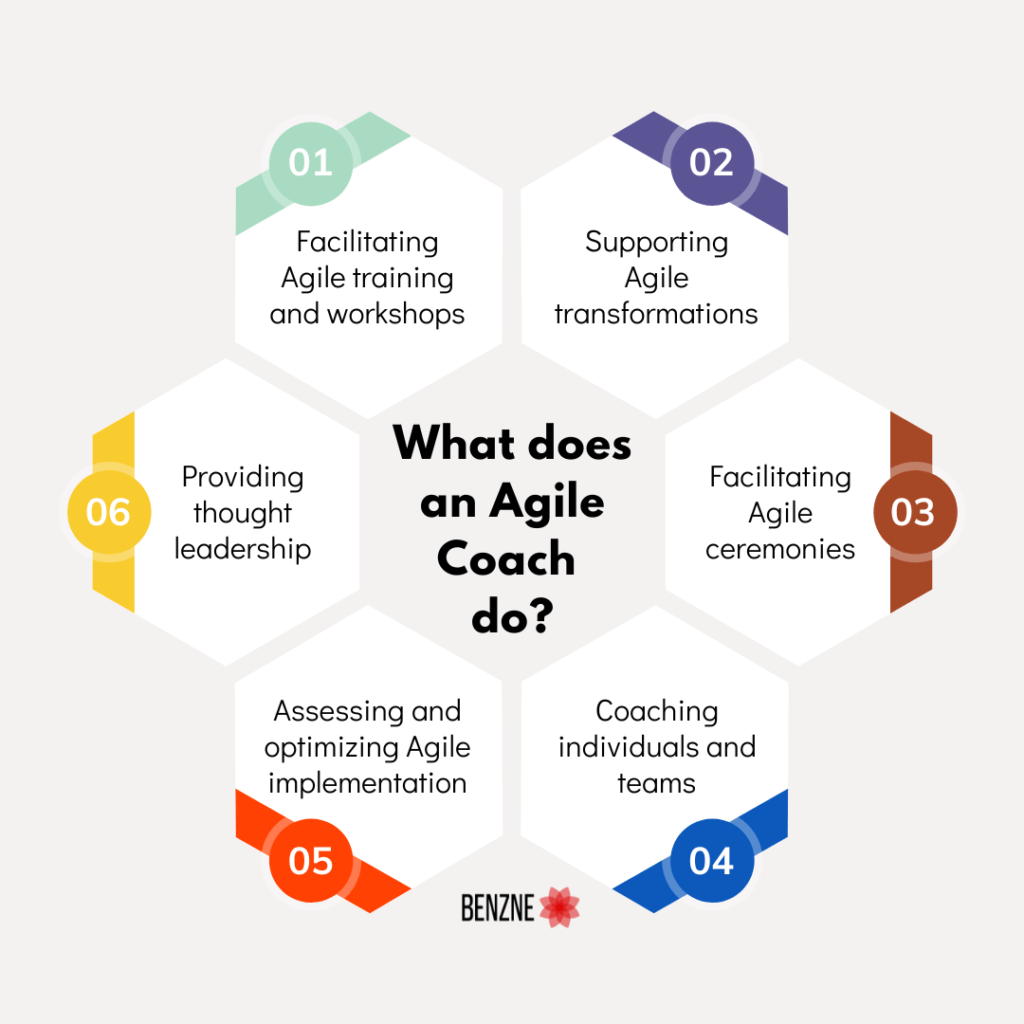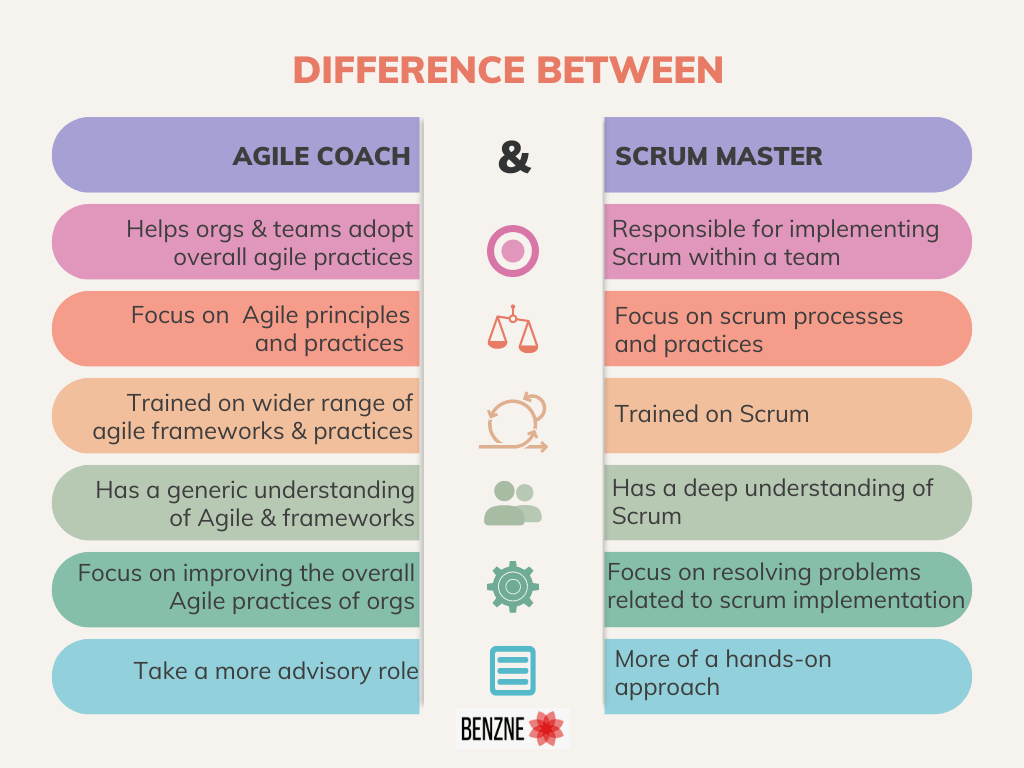Introduction to Agile Coach
Bringing change through agile coaching is a 3 step journey –
- Know agile: In this state, the intention is to create awareness and bring everyone on the same page. It happens by trainer led workshops, customized Agile trainings, watching videos, listening to podcasts, reading books or blogs & other sources
- Do agile: Once we have the awareness in place, it is important to apply the practices diligently and repeat them till it becomes the habit and we start seeing those traits mastered by the team. Already, an individual or team will start reaping the benefits
- Be agile: After implementing the practices, team reaches the state where they start finding the gaps in their current process, identifies the opportunities of improvement and collectively develop a goal-focused mindset which drives them to create the ‘right mix’ which meets the objectives and enables the to a continuous evolution journey
An agile coach helps a target area to attain the different levels till that focused group becomes self-organizing, self-managing and high performing.
This Blog aims at understanding
- What exactly is Agile Coaching?
- What do the Agile Coaches do? What are their skills?
- Difference between Scrum masters and Agile Coaches
- Why is Agile Coaching important?
- What do External Agile coach consultants bring to the table?
What is Agile Coaching?
Agile coaching is an act of helping organizations and teams adopt and improve their overall Agile practices and inculcate agility. Agile coaches work with organizations and teams to help them understand the agile mindset, principles, frameworks and to apply these in their areas of work.
Agile coaching typically involves working with organizations and teams to identify their unique challenges, needs, and to help them implement the most effective agile practices for their particular situation. This may involve agile training and mentoring team members, facilitating agile ceremonies such as sprint retrospectives, and helping organizations and teams adopt agile frameworks such as Scrum, Kanban, Extreme programming or lean.
The goal of agile coaching is to help organizations and teams become more agile if they are already embracing agile, and introduce agility across teams, thereby delivering better results and achieving higher levels of productivity, quality, and customer satisfaction. Agile coaches continuously improve the team’s agile practices over time, adapting to changing needs and conditions as they move forward.
Who is An Agile Coach?
An agile coach is not a manager or a decision-maker, but rather a supportive and collaborative partner who helps teams improve their agile practices over time. A good agile coach has a deep understanding of agile methodologies and a passion for helping organizations and individuals achieve their goals through agile.
What does an Agile Coach do?
An Agile Coach is a professional who helps organizations and teams adopt and improve their agile practices. The main responsibilities of an agile coach include:

Additionally, a good agile coach should have the following key characteristics:
- Deep understanding of Agile: A good agile coach should have a deep understanding of agile principles, practices, and methodologies, and be able to apply this knowledge effectively in a variety of situations
- Strong communication skills: A good agile coach should be an effective communicator, able to articulate complex ideas in simple terms and engage teams in constructive dialogue
- Empathy and emotional intelligence: A good agile coach should be able to understand and empathize with the perspectives and experiences of others, and use this understanding to build trust and facilitate collaboration
- Adaptability: A good agile coach should be able to adapt their approach to the needs of different organizations and teams, and be able to modify their coaching style as needed
- Facilitation skills: A good agile coach should be skilled in facilitating agile ceremonies, such as sprint retrospectives, and be able to engage teams in productive discussions and problem-solving
- Experience in coaching and mentoring: A good agile coach should have experience coaching and mentoring individuals and teams, and be able to provide guidance and support to help teams improve their practices
- Passion for continuous improvement: A good agile coach should have a passion for continuous improvement and be able to inspire and motivate teams to continuously improve their practices
- Technical knowledge: A good agile coach should have a good understanding of technical concepts and be able to work effectively with development teams and stakeholders
- Commitment to transparency and ethics: A good agile coach should be committed to transparency and ethics in their coaching practices, and be willing to hold themselves accountable for their actions and decisions
In short the role of an Agile Coach is to help organizations and teams effectively adopt and improve their Agile practices and also to ensure that teams don’t go back to old ways of doing things.
Achieve success with agile project management consulting. Expert guidance for efficient planning, execution, and delivery. Explore our services now.
What are the Key Skills of an Agile Coach?
An agile coach must have a diverse set of skills, including a deep understanding of agile methodologies, strong facilitation and coaching skills, and excellent communication and adaptability skills in order to be effective in their role.
Some of the key skills of an Agile Coach include:
- Knowledge of Agile methodologies: A deep understanding of agile methodologies, such as Scrum, Kanban, and Lean, is essential for an agile coach to be able to effectively guide organizations and teams in their cgile transformations
- Facilitation skills: An agile coach must be able to effectively facilitate agile training and workshops, as well as agile ceremonies such as sprint planning and retrospectives
- Coaching skills: An agile coach must have strong coaching skills in order to provide ongoing support and guidance to individuals and teams as they adopt and improve their agile practices
- Communication skills: An agile coach must have excellent communication skills in order to effectively articulate complex agile concepts and facilitate discussions with a wide range of stakeholders, including senior management, teams, and customers
- Adaptability: Agile methodologies emphasize flexibility and the ability to adapt to change. An agile coach must be able to adapt their approach to the unique needs and challenges of each organization and team they work with
- Technical expertise: An agile coach should have a strong understanding of software development and project management in order to provide practical advice and guidance on how to apply agile methodologies in these areas
- Continuous learning: The field of agile is constantly evolving, and an agile coach must be committed to ongoing learning and improvement in order to stay current with the latest trends and best practices.
Most importantly an agile coach must be a people’s person, assertive and compassionate. With these skills, an agile coach can effectively help organizations and teams adopt and improve their agile practices.
What is the Difference Between a Scrum Master And an Agile Coach?

Why is Agile Coaching Important?
There are several reasons why organizations and teams may need agile coaching:
- Adopting Agile: Organizations that are new to agile may need an agile coach to help them understand and adopt agile practices and methodologies, such as scrum or kanban
- Improving Agile practices: Teams that are already using agile may need an agile coach to help them improve their practices and overcome specific challenges
- Scaling Agile: Organizations that are looking to scale their agile practices across multiple teams or departments may need an agile coach to help them coordinate and standardize their efforts
- Overcoming cultural barriers: Some organizations may have a culture or work environment that is not well-suited to agile practices. An agile coach can help teams overcome these cultural barriers and adopt agile practices more effectively
- Improving team performance: Teams that are not performing as effectively as they could may benefit from the guidance and mentorship of an agile coach, who can help them identify and address performance issues
- Building a continuous improvement culture: Agile coaches help organizations and teams adopt a continuous improvement mindset, allowing them to continuously improve their practices over time and stay ahead of the competition
An agile coach can provide valuable guidance, mentorship, and support to all levels in an organization and teams as they adopt and improve their agile practices, leading to better agility.
External Agile Consultant or Internal Agile Coach? Who is Best Suited for Agile Coaching?
When it comes to agile coaching in an organization, there are two ways with which results can be achieved. One is by hiring an external agile consultant from an external agile consulting firm or hiring an internal agile coach. Let’s understand the key differences in detail.
External agile consultants and internal agile coaches serve similar purposes, but there are some key differences between them:
- Neutral Outside-In Perspective: External agile consultants bring an “outside- in” perspective and can help a company see its processes from a new angle. Internal agile coaches, on the other hand, are familiar with the company’s culture and may have a deeper understanding of its unique challenges and opportunities
- Independence: External agile consultants are less likely to be influenced by company politics and can offer an impartial viewpoint. Internal agile coaches may have more difficulty remaining impartial, especially if they have a prior relationship with team members
- Cost Effectiveness: External agile consultants are generally time-bound. That is, external consultants can be hired until the results are achieved and when the teams are agile, their services can be discontinued. While internal agile coaches may tend to become a cost center for the company as they are already on the company’s payroll and once the teams are agile or the results are achieved, their relevance becomes a question
- Experience and Expertise: External agile consultants may have a wider range of experience, having worked with different companies and in different industries. Internal agile coaches may have more in-depth knowledge of the company’s specific processes and challenges.
Ultimately, both external agile consultants and internal agile coaches can bring value to a company and help teams improve their agile processes. The best approach will depend on the company’s specific needs and resources.
Conclusion
With this, our blog “Why is Agile Coaching ‘More’ than Knowing The Process?” comes to an end. We really hope this is of help. In case of any feedback or suggestions, please reach out to us at consult@benzne.com.
Write to us if you need any support in your agile transformation journey or specific agile coaching needs.







